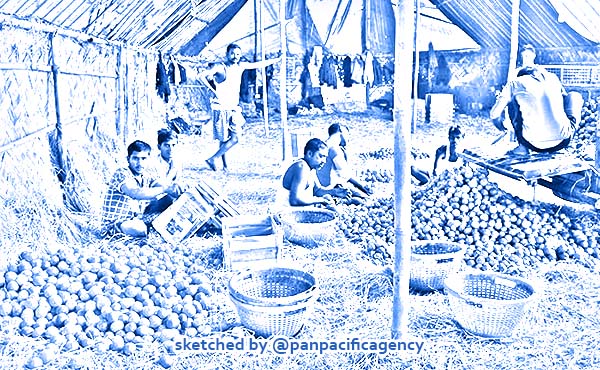Bhutan’s exports hit by ‘extortion racket’ of Bengal journalists, SSB officers, police probe on

Mandarin exporters in Bhutan. Photo: Kuensel online. Sketched by the Pan Pacific Agency.
NEW DELHI, Oct 13, 2021, ThePrint. An extortion “nexus” in West Bengal’s Jaigaon, believed to be operating with the help of officers in the Sashastra Seema Bal (SSB), has allegedly been targeting Bhutan’s exports to India, like vegetables and fruits, as well the country’s imports, ThePrint has learnt, ThePrint reported.
Although Bhutan has not officially taken up the matter with India on a bilateral level, officials have told ThePrint that extortion incidents are common at border posts and this case, like many others, is under investigation.
Jaigaon, a small town located in Alipurduar district in West Bengal, borders Phuentsholing town of Bhutan.
Speaking to ThePrint, a senior West Bengal police officer in the Alipurduar district said: “These sort of allegations are regular and these keep coming from the exporters on both sides. We investigate as and when we get those and take action. The specific case, registered more than a week ago, is now being investigated.”
The officer added: “Allegations of high-handedness or extortion against the border guarding forces are generally handled by the force internally. We cannot comment on the SSB personnel’s case. They have a protocol in the force and they investigate their people on their own. These kinds of processes take time.”
SSB’s Director General Kumar Rajesh Chandra told ThePrint: “An inquiry has already been enforced by the SSB Siliguri Frontier. One of the accused officers has been transferred out of the frontier to ensure fairness of the inquiry.”
According to a second official source in the Alipurduar district, such local border incidents have become regular now owing to Bhutan closing its borders due to the Covid-19 pandemic on 23 March 2020. As a result of which, goods get stuck there.
ThePrint tried to reach Alipurduar MP John Barla, the Union Minister of State for Minority Affairs, through calls and text messages, but did not receive a response until the time of publishing this report.
The Bhutanese, a local newspaper in capital Thimphu, first reported about the extortion nexus three weeks ago. The report explained that those involved, which allegedly includes five ‘journalists’ and some SSB officers, get prior information of consignments from a private employee of the clearing agent at the customs office in Jaigaon. Documents for import or export have to be filed with the customs officer two to three days in advance.
“They then approach the importer or exporter in Jaigaon and demand hefty amounts,” the report claimed. If the trader does not comply, the five journalists spread negative news on Facebook about the consignment, after which, their associates in the SSB stop the vehicle and send it back to Phuentsholing, it added.
However, a senior police official in the Alipurduar district told ThePrint: “I do not remember any case lodged against any local reporter of Jaigaon.”
According to analysts and government sources, extortion rackets targeting the flow of goods is common at India’s border posts.
Prabir De, a professor at Delhi-based Research and Information System for Developing Countries, told ThePrint: “This doesn’t just happen in Jaigaon, but at all the border posts. In Manipur, which borders Myanmar, these incidents have been heightened due to the insurgency there and exporters in the state have stopped exporting. No one wants to take the risk.”
According to a source, goods continue to get stuck on the border as Bhutan is not letting normal trade to resume due to restrictions in movement of goods, increasing the chances of illicit trading. Thus, India has put in place some strict measures before it allows entry of goods from that country.
De suggested that the way to avoid this extortion is “by utilising smart-border technology and other advanced technology at border posts”.
With inputs from Nayanima Basu. Edited by Shreyas Sharma.